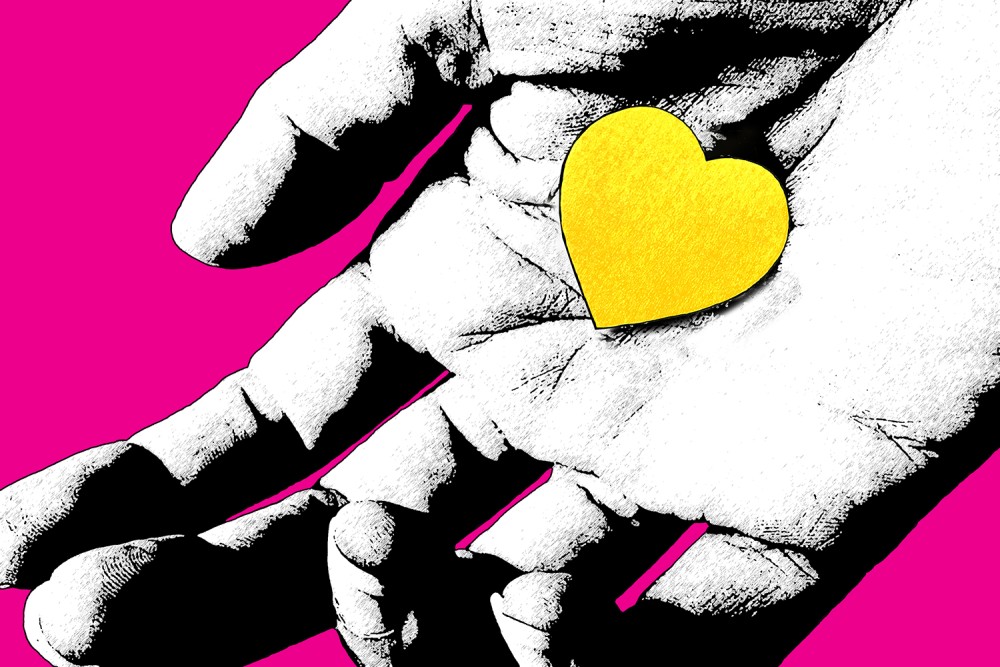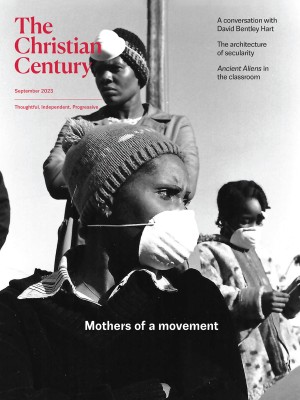Compassion makes us human
When we fail to be compassionate, the refrain “Well, we’re only human” is exactly wrong.

(Source illustration by Rosemary Gerardy / iStock / Getty)
I’ve always paid close attention to the news. Indeed, I’ve come to understand my engagement with what the Washington Post’s Phil Graham called “the rough first draft of history” as a token of my Christian vocation to respond to God’s world with attention, compassion, and service.
In recent years, however, I’ve noted a growing and, for me, troubling tendency to disengage. News about imminent climate collapse, as well as war in Ukraine and countless other places, has shaken my desire to attend to what is going on. When one adds to this the ongoing emotional ripples generated in the wake of the pandemic, I want to unplug completely from an awareness of the sheer levels of need and suffering.
Read our latest issue or browse back issues.
I am not alone. A recent Reuters Institute report suggests that there has been a sharp decline in the public’s appetite for news. In the United Kingdom, more than a third of people now say they actively avoid it, especially the weighty stuff, in order to protect their mental health.
Surely there is no point making yourself depressed by doomscrolling through endless bad news. Yet God calls us out of ourselves into compassion for the world. The death and resurrection of Jesus Christ is the very icon of divine compassion: God comes among us as one of us and, through his self-offering, shows us the way that leads to abundant life. As many people know, at its root, compassion means “suffer with.” Through his suffering with and alongside us, Jesus invites us to grow into his likeness: to shape our lives according to the way of self-offering, giving, and compassion.
As a Christian, then, I believe myself called to engage with the facts of the world and make a compassionate response. I think I am right to be troubled by my instinct to run away from the news or plug my ears and say, “La, la, la, I’m not listening.” Given all that is going on in the world, my compassion fatigue is almost certainly understandable. It is a way of coping. I do not simply want to cope, however; I long not to seal up my compassionate heart.
Perhaps Henri Nouwen can help us diagnose both the blockages to compassion and the routes back toward reengaging with its demands. Nouwen suggests that compassion is nothing more or less than “full immersion in the condition of being human.” He reminds us that compassion takes us to the deepest and most profound reality of our human embodiment. When we are compassionate we are caught up in our fullest humanity.
If Nouwen’s right, and I think he is, then compassion surely implies that to be human is all about relationship and connection. For without relationship I cannot see how it is possible to suffer with and alongside other humans. When we fail to be compassionate or good or loving, it has become something of a modern refrain to say, “Well, we’re only human.” Here’s the rub, though: that’s precisely what we’re not. We struggle to be human.
Indeed, I have come to believe that there is a liberating beauty and challenge in acknowledging that there has only ever been one human being, Jesus Christ. The rest of us are approximations. We are sketches. If we were in a movie, we’d be the badly rendered CGI. Insofar as we are unable to be compassionate, we are not being “all too human” so much as not human, not yet.
I love that compassion in both Hebrew and Greek has a bodily significance. The Hebrew word for compassion is rachuwm. It is taken from the root word rechem, which means “womb.” When I became aware of the connection between womb and compassion, I felt I had encountered something of the structure of God’s first language. I felt as if something of the world’s substrate was revealed. This is the God who feels for us in the womb. Similarly, the ancient Greek for “guts” is splagchnizomai. One of its implications is “being moved to one’s bowels,” which itself means moved to compassion. For in classical culture, the bowels were the seat of compassion and pity.
These etymological connections underline how in baptism, as we are born again in Christ, we encounter the compassion of God who feels for us in the womb; they also underline how in Eucharist we are sustained and renewed as we take God into our guts. To be members of the body of Christ means that we are people of compassion—of gut and of womb.
To speak in such terms is a reminder that the life of compassion to which God invites us is a costly, embodied one. It is never simply an idea or reducible to good intentions. It entails coming to terms with the violence and cruelty seemingly sealed into our species’ DNA, as well as being prepared to live in resistance to such violence. The life of compassion entails daring to be caught up in this world without simply being crushed by it or seeking to decouple our hearts from it.
Novelist Milan Kundera, who died in July, suggests that “there is nothing heavier than compassion. Not even one’s own pain weighs so heavy as the pain one feels with someone, for someone, a pain intensified by the imagination and prolonged by a hundred echoes.” To live the life of compassion is a costly vocation. Jesus Christ shows us that. When I feel such a vocation is too much for my frail flesh, I remember Christ shows me otherwise. To become more compassionate is to become more human, and therefore more divine. In my own power that is unfeasible. However, in Christ, nothing is impossible.






